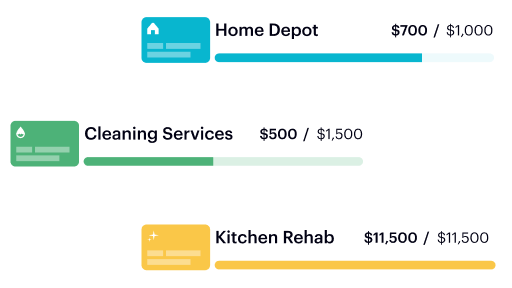Calculating your rental property operating expenses starts with understanding these costs. While it may seem like every cost associated with your rental is a property expense, the truth is that not all common charges fall under this category.
You won’t accurately understand how well your business performs if you don’t report these costs properly. You may also get fined.
In this article, we’ll share the definition of property expense. We’ll also share common rental property operating expenses, how to calculate them, and a few examples of charges that don’t fall in this category.
What Are Operating Expenses in Rental Properties?
If you’re renting out your property, there are some expenses you’ll have to cover. These are known as operating expenses.
Rental property expenses refer to any cost required for your business’s daily operation.
Gross operating income is the percentage of rental revenue you spend on operational expenses. In most cases, landlords try to keep this expense ratio between 35% and 45% to stay well above the profit line.
What Is Included in Rental Property Operating Expenses?
Real estate investors must understand operating expenses for rental property. This will help ensure they’re putting as many charges as possible as a property expense without incurring a fine or fee.
Operating expenses vary based on each rental property. Remember, the state and city laws affect your rental property, so it’s important to review the local regulations to ensure that your expenses are considered operational.
- Marketing and advertising: Print ads, social media boosts, and all of the activities you pursue to promote your property fall under the category of property expense.
- Transport costs: If you commute to your unit, you can place transport costs on your property expenses, including petrol and the reasonable vehicle purchase.
- Maintenance, repairs, and cleaning: If your property needs to be repaired, maintained, or professionally cleaned, you can put these expenses against your property.
- Landlord insurance costs: Landlord insurance can be costly, but fortunately, this qualifies as operating expenses in most areas.
- Professional fees: It’s common for real estate investors to hire professional providers, like legal, snow removal, pest control, or accounting services. Generally speaking, most of these count as property expenses.
- Property management fees: If you hire a property manager, you can put this cost on as a property expense. However, remember that this excludes the landlord’s time, so you can’t put in your own time if you’re the property owner.
- Mortgage interest: Depending on the area, mortgage interests may fall under landlord operating expenses.
- Real estate or landlord software expenses: It’s common for property owners to use software to manage their units, take care of their accounting, and even schedule every mortgage payment. This type of tool can be counted as a legitimate operating expense.
- Property taxes: Unlike rental property owners’ income tax, property taxes can be classified as an operating expense.
- Homeowners Association (HOA) fees: Property owners that own an apartment, dual property, or multifamily unit must cover HOA fees. These can vary tremendously, but they count as total operating expenses in most areas.
- Utilities: Electricity, water, internet, and other essential utilities can be counted as property expenses.
As you can see from the list above, if you own a rental property with special features, like a fountain or outdoor area, you may have more operating expenses (i.e., from Insurance) than other real estate investors.
Remember that the income tax generated from your property revenue is not an operating expense. That said, you should still explore other landlord tax deductions to help lower your tax bill.
How to Calculate and Track Operating Expenses for Rental Property?
The first step to monitoring your operating expenses is understanding which expenses fall under this category. That said, as a real estate investor or property manager, it’s also essential to learn how to calculate and track rental operating expenses properly.
First, review any local regulations that may impact the operating expenses of your rental property.
Then, it would help if you created a table listing every property expense you must cover. Ensure also to collect a payment confirmation stub or receipt after payment.
Remember that you must follow no required laws or methods to track and calculate your property expenses. However, you must ensure your rental property costs are accurately tracked, categorized, and paid on time.
With the above in mind, your best alternative is to use a tool or platform that helps you track the operating income and costs of your rental property investment.
Using an all-in-one property management software is a great idea because it can help you track property management fees and similar costs without adding another tool to your real estate technology stack.
What Expenses Are Excluded from Operating Expenses?
We’ve covered what is included in operating expenses for rental property. But knowing what doesn’t qualify as a property expense is equally essential.
As mentioned, landlord tax deductions don’t fall under valid operating expense deductions. Here are other operating expenses for real estate that don’t qualify as property costs.
- Land transfer taxes
- Sale-related legal fees
- Home inspection fees
- Mortgage application fees
- Home appraisal costs
- Moving expenses when the landlord is currently occupying the home
- Property sale taxes
How to Pay Rental Property Operating Expenses with Rental Payment Using Baselane?
Baselane is a robust rental property management platform best fit for single or multiple units. The software allows you to automatically import existing bank account or debit/credit card transactions using third-party software, Plaid, and seamlessly monitor and manage the payments related to your investment property.
Thanks to its integrations with Plaid, Baselane can verify the bank accounts and cards and import each transaction into the master transaction ledger.
You can categorize the income and expenses from here based on Schedule E categories. Baselane allows you to customize the categories available and creates property analytics that make it easy to review your rental property’s financial performance.
Finally, you can use Baselane’s landlord banking account to pay expenses via ACH or wire transfers.
Final Thoughts
Understanding, tracking, and paying for the operating expenses of your rental property is crucial. With that said, dozens of different charges are considered necessary property expenses, and many more are not.
So, remember to review your local regulations, speak to a real estate professional, and ensure you won’t get penalized for certain charges before creating your list of expenses.






